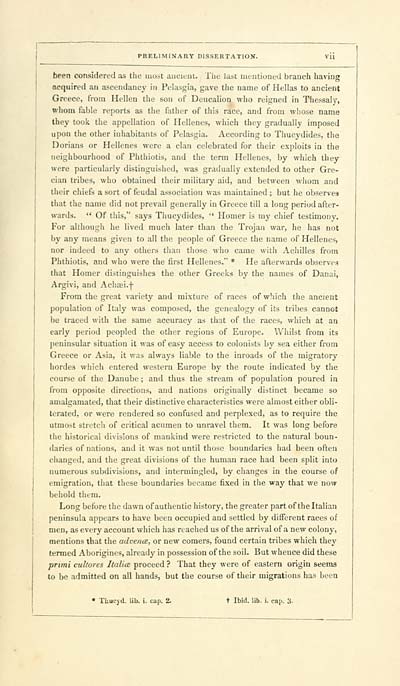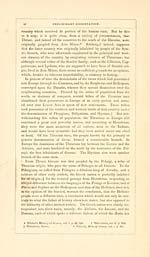Download files
Complete book:
Individual page:
Thumbnail gallery: Grid view | List view

PRELIMINART DISSERTATION. Vll
been considered as the luoit aiicieiu. The last mentioned branch havuig
acquired an ascendancy in Pelasgia, gave the name of Hellas to ancient
Greece, from Hellen the son of Deucalion who reigned in Tliessaiy,
whom fable reports as the father of this race, and from whose name
they took the appellation of Hellenes, which they gradually imposed
upon the other inhabitants of Pelasgia. According to Tlmcydides, the
Dorians or Hellenes were a clan celebrated for their exploits in the
neighbourhood of Phthiotis, and the term Hellenes, by which they
were particularly distinguished, was gradually extended to other Gre-
cian tribes, who obtained their military aid, and between whom and
their chiefs a sort of feudal association was maintained ; but he observes
that the name did not prevail generally in Greece till a long period after-
wards. " Of this," says Thucydides, " Homer is my chief testimony.
For although he lived much later than the Trojan war, he has not
by any means given to all the people of Greece the name of Hellenes,
nor indeed to any others than those who came with Achilles from
Phthiotis, and who were the first Hellenes." * He afterwards observes
that Homer distinguishes the other Greeks by the names of Danai,
Argivi, and Achaji.f
From the great variety and mixture of races of which the ancient
population of Italy was composed, the genealogy of its tribes cannot
be traced with the same accuracy as that of the races, which at an
early period peopled the other regions of Europe. Wliilst from its
peninsular situation it was of easy access to colonists by sea either from
Greece or Asia, it was always liable to the inroads of the migratory
hordes which entered western Europe by the route indicated by the
course of the Danube ; and thus the stream of population poured in
from opposite directions, and nations originally distinct became so
amalgamated, that their distinctive characteristics were almost either obli-
terated, or were rendered so confused and perplexed, as to require the
utmost stretch of critical acumen to unravel them. It was long before
the historical divisions of mankind were restricted to the natural boun-
daries of nations, and it was not until those boundaries had been often
changed, and the great divisions of the human race had been split into
numerous subdivisions, and intermingled, by changes in the course of
emigration, that these boundaries became fixed in the way that we now
behold them.
Long before the dawn of authentic history, the greater part of the Italian
peninsula appears to have been occupied and settled by different races of
men, as every account which has reached us of the arrival of a new colony,
mentions that the adveniE, or new comers, found certain tribes which they
termed Aborigines, already in possession of the soil. But whence did these
prtmi cultores Italia proceed ? That they were of eastern origin seems
to be admitted on all hands, but the course of their migrations has been
• Thucyd. lib. i. cap. 2. t Ibid. lib. i. cap. 3-
been considered as the luoit aiicieiu. The last mentioned branch havuig
acquired an ascendancy in Pelasgia, gave the name of Hellas to ancient
Greece, from Hellen the son of Deucalion who reigned in Tliessaiy,
whom fable reports as the father of this race, and from whose name
they took the appellation of Hellenes, which they gradually imposed
upon the other inhabitants of Pelasgia. According to Tlmcydides, the
Dorians or Hellenes were a clan celebrated for their exploits in the
neighbourhood of Phthiotis, and the term Hellenes, by which they
were particularly distinguished, was gradually extended to other Gre-
cian tribes, who obtained their military aid, and between whom and
their chiefs a sort of feudal association was maintained ; but he observes
that the name did not prevail generally in Greece till a long period after-
wards. " Of this," says Thucydides, " Homer is my chief testimony.
For although he lived much later than the Trojan war, he has not
by any means given to all the people of Greece the name of Hellenes,
nor indeed to any others than those who came with Achilles from
Phthiotis, and who were the first Hellenes." * He afterwards observes
that Homer distinguishes the other Greeks by the names of Danai,
Argivi, and Achaji.f
From the great variety and mixture of races of which the ancient
population of Italy was composed, the genealogy of its tribes cannot
be traced with the same accuracy as that of the races, which at an
early period peopled the other regions of Europe. Wliilst from its
peninsular situation it was of easy access to colonists by sea either from
Greece or Asia, it was always liable to the inroads of the migratory
hordes which entered western Europe by the route indicated by the
course of the Danube ; and thus the stream of population poured in
from opposite directions, and nations originally distinct became so
amalgamated, that their distinctive characteristics were almost either obli-
terated, or were rendered so confused and perplexed, as to require the
utmost stretch of critical acumen to unravel them. It was long before
the historical divisions of mankind were restricted to the natural boun-
daries of nations, and it was not until those boundaries had been often
changed, and the great divisions of the human race had been split into
numerous subdivisions, and intermingled, by changes in the course of
emigration, that these boundaries became fixed in the way that we now
behold them.
Long before the dawn of authentic history, the greater part of the Italian
peninsula appears to have been occupied and settled by different races of
men, as every account which has reached us of the arrival of a new colony,
mentions that the adveniE, or new comers, found certain tribes which they
termed Aborigines, already in possession of the soil. But whence did these
prtmi cultores Italia proceed ? That they were of eastern origin seems
to be admitted on all hands, but the course of their migrations has been
• Thucyd. lib. i. cap. 2. t Ibid. lib. i. cap. 3-
Set display mode to: Large image | Transcription
Images and transcriptions on this page, including medium image downloads, may be used under the Creative Commons Attribution 4.0 International Licence unless otherwise stated. ![]()
| Early Gaelic Book Collections > Ossian Collection > History of the Highlands and of the Highland clans > Volume 1 > (27) |
|---|
| Permanent URL | https://digital.nls.uk/79672921 |
|---|
| Description | Vol. I. |
|---|---|
| Shelfmark | Oss.247 |
| Additional NLS resources: | |
| Attribution and copyright: |
|
| Description | Selected books from the Ossian Collection of 327 volumes, originally assembled by J. Norman Methven of Perth. Different editions and translations of James MacPherson's epic poem 'Ossian', some with a map of the 'Kingdom of Connor'. Also secondary material relating to Ossianic poetry and the Ossian controversy. |
|---|
| Description | Selected items from five 'Special and Named Printed Collections'. Includes books in Gaelic and other Celtic languages, works about the Gaels, their languages, literature, culture and history. |
|---|

